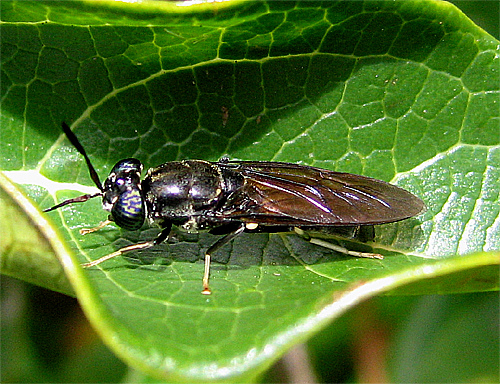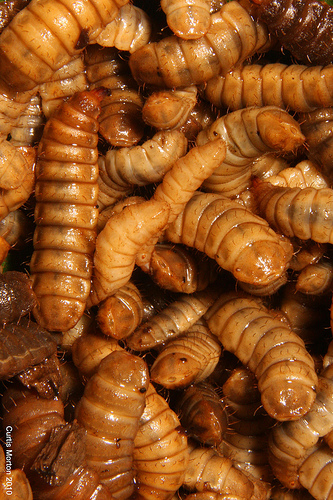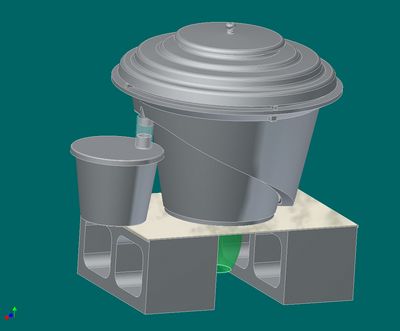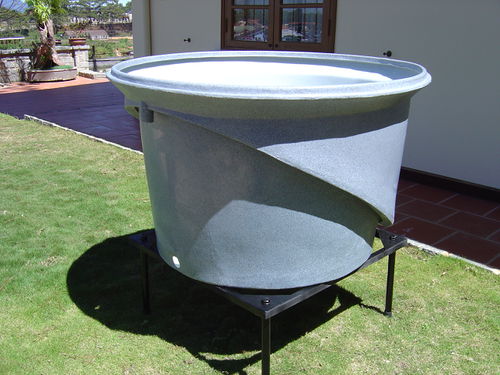Black Soldier Fly
Main > Food and Agriculture > Soil and compost
Basics
- Parts of this text were taken an article by Dr. Paul Olivier - please read the original here (TODO: Link to original is broken. Replace with link to archive, or PDF copy of original).
- Larvae of the black soldier fly (BSF), Hermetia illucens, can be used to convert many kinds of organic waste, including putrescent waste such as meat and dairy products
- Soldier Grubs are not associated in any way with the transmission of disease; They do not bite, bother or pester humans in any way, In fact, they send out a (pheromonal?) signal to house flies: get lost !
- 3 "Products" are produced, the larvae, the residual partially composted (and substantially compacted/size reduced) solids, and a leachate
Applications and Product Ecology
- Soldier Grubs can be fed to chickens or fish (see: aquaponics). They can become an important part of any integrated food and waste management system.
- Oils from Soldier Grubs has been proposed for making diesel - like biofuels and a protein-rich feed additive
- Whatever is left after the Soldier Grubs are done eating can be eaten by worms (vermicomposting), dramatically reducing the weight and volume of the compost
Open-source Black Soldier Fly composter
http://blacksoldierflyblog.com/bsf-bucket-composter-version-2-1/ - An open hardware project to build a grub composter for Black Soldier Fly. Includes automatic harvesting of the larvae. The grubs abandon the waste only when they have reached their final mature prepupal stage, and they crawl out of the waste and into a collection bucket without any mechanical or human intervention.
The design is for a 5 gallon (19l) bucket that could process a maximum of 1lb (454g) of food scraps a day. Performance testing shows that you can get about 1 kilo of grubs for every seven kilos of food waste you put in, so you could get a maximum of 7lb (3.17kg) of grubs a week from just a 5 gallon bucket. If the grubs are used as fish food in aquaponics, the grubs from this bucket could easily sustain an aquaponics system with a 5000l tank.
Building Bins
Videos
Sourcing
- Larvae source - [1]
Food Value
- 1000 calories per kilogram - [2]
Breeding
- home system - [3] (TODO: Link is broken. Fix or delete.)
- LEDs - [4]
Production
- 20 ton per week in a facility in China - [5]
- Spent brewer's grain and grass clippings can grow house flies
Efficiencies
- 15 kg of putrescent material can be processed per m2 of surface area - at a conversion rate of 20% into BSF body mass. Source - [6]. This indicates that 3 kg of BSF mass is produced per day from 15 kg of waste. If fish convert this to fish body mass, then 1.5 lb of fish mass growth can be sustained by this level of feeding. This appears to be comparable (same order of magnitude) to the 16 square meters of gutters (240 feet of 6" gutter) that would be required to produce 3lb of duckweed.
- Commercial ProtaPod has a digestion rate of 20lb of scraps per day - or produces 4 lb of BSF per day. This is outstanding for a 1 square meter footprint-[7]. Cost is $350.
BSF as Fish Food
- This paper says BSF can be used to replace 30% of fish food in catfish - [8]
- BSF can replace 25% of fishmeal - [9]
- For tillapia fish food with 15% fish meal, 50% of the fish meal can be replaced with BSF (7.5% of overall feed) - [10]
- Tilapia are not carnivores, so they can't eat 100% BSF. -[11]
- good video from Plant Chicago - [12]
Human Waste Processing
- This paper concluded that BSF can be an effective solution to the processing of human waste - [13]. 20% bioconversion (conversion from feces to larval mass) and 2-3 feed conversion ratio (ratio of food mass to BSF larval mass)
3D Printing of Bin
- This should be relitively easy
- Perhapss could even be done in Vase Mode (FDM 3D Printers)
See Also
Useful Links
- Mass production of BSF - [14]
- How to grow them - [15] and download - File:Bsf.pdf
- Scientific American article on BSF as fish food - [16]
- Black Soldier Fly Farming website
- Black Soldier Fly Blog
- Agroinnovations Podcast on BSF
- Wikipedia: Black Soldier Fly
- ESR International LLC - Dr. Paul Olivier and proprietary technologies: BioPod™ Classic, BioPod™ Plus, ProtaPod™
- Very detailed information from a project in Brazil (Dr. Paul Olivier) (TODO: Link is broken. Fix me or delete.)



